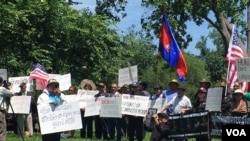Protests were held in the United States, Canada, France and Australia over the weekend to demand the release of Cambodian human rights defenders and opposition members.
Holding banners bearing photos of detained human rights defenders, environmental activists, and opposition officials and activists, protesters in Washington, DC called for U.S. intervention and for their immediate and unconditional release.
“We see that the current political situation has been changed,” said Touch Vibol, president of the Cambodian American Alliance. “This means that the culture of dialogue between the two leaders has failed. This is why we have to come to protest today against arrests… we are protesting here today to show that there is not enough freedom and full respect for human rights in Cambodia.”
If their demands are not met, protesters have called for economic and diplomatic sanctions on the Hun Sen government, especially on senior officials with business interests.
Four human rights defenders – Ni Sokha, Nay Vongda, Yi Soksan, and Lim Mony – and election official Ny Chakrya have been jailed for allegedly bribing a witness in a sex scandal case involving opposition leader Kem Sokha. More than 10 opposition activists and officials have been jailed on charges related to a violent protest and the supposed forgery of maps of the Cambodia-Vietnam border. Two U.S. citizens, Meach Sovannara and Um Sam An, are among those detained.
Sorakphy Ou, a protester from Minnesota and a former education official, said she came to protest against repression because people are now living in fear despite some economic progress in the country.
“Economic growth is what we can see with our own eyes, but people hide their real feeling of pain,” said Sophyrak Ou. “They are superficially happy, but deep down they suffer mentally.”
Mary N. Uy, travelled all the way to Washington, D.C., to attend the protest to make sure that her voice is heard despite the fact people in her own state of Massachusetts also held a protest there.
Mary sees that apart from restricting liberty, Cambodia’s economic growth has been made at the expense of forest resources.
“We see some changes, but forests and islands are all gone,” she said.
Protests took place simultaneously in Massachusetts, Washington State, California, and Canada last Friday.
Navan Cheth, a protest organizer in Long Beach, CA, said the US should intervene more, otherwise there will not be a peaceful transfer of power if the opposition wins the election in 2018.
“I’m very worried because the opposition party does not have any weapons,” Cheth told VOA Khmer by phone from Long Beach. “Hun Sen’s party has weapons.”
The protest in Canada drew several hundred participants.
“We are asking Canada, who was a signatory country to the Paris Peace Agreement on 23 October 1991, to put pressure on Cambodian government to respect the agreement,” Sothi Kang, a protester, told VOA Khmer by phone. “The government must release all activists without conditions. This includes land activists, environmental activists, political party activists, human rights defenders, and an election official.”
Protesters also urged the U.S. to create a so-called “Cambodia Contact Group,” with the participation of the U.S., the United Kingdom, France, Australia, Japan, and Indonesia. The team would work to ensure that there will be a free and fair elections and a peaceful transfer of power if the opposition was successful.
U.S. Congressman Alan Lowenthal (D-CA 47th District) said the political situation in Cambodia was not favorable for the opposition, pointing to opposition leader Sam Rainsy’s decision to enter self-imposed exile and ongoing court cases against his deputy, Kem Sokha.
“This current political environment of fear and intimidation, which has been created by the Hun Sen government, offers little hope for fair elections in 2017 and 2018,” Alan Lowenthal told the crowd in front of the US Capitol.
Congressman Lowenthal and Congressman Matt Salmon last month introduced a House resolution calling for human rights, democracy, and the rule of law in Cambodia.
A spokesman for the Cambodian government, Phay Siphan, dismissed the protests as “nothing but an attempt to manipulate it for power and gain for their party.”
“They take this as a springboard for political gain and then destroy peace and progress,” he added. “Only those who live in the past prefer the U.S. to take action on Cambodia. This is a shame.”







